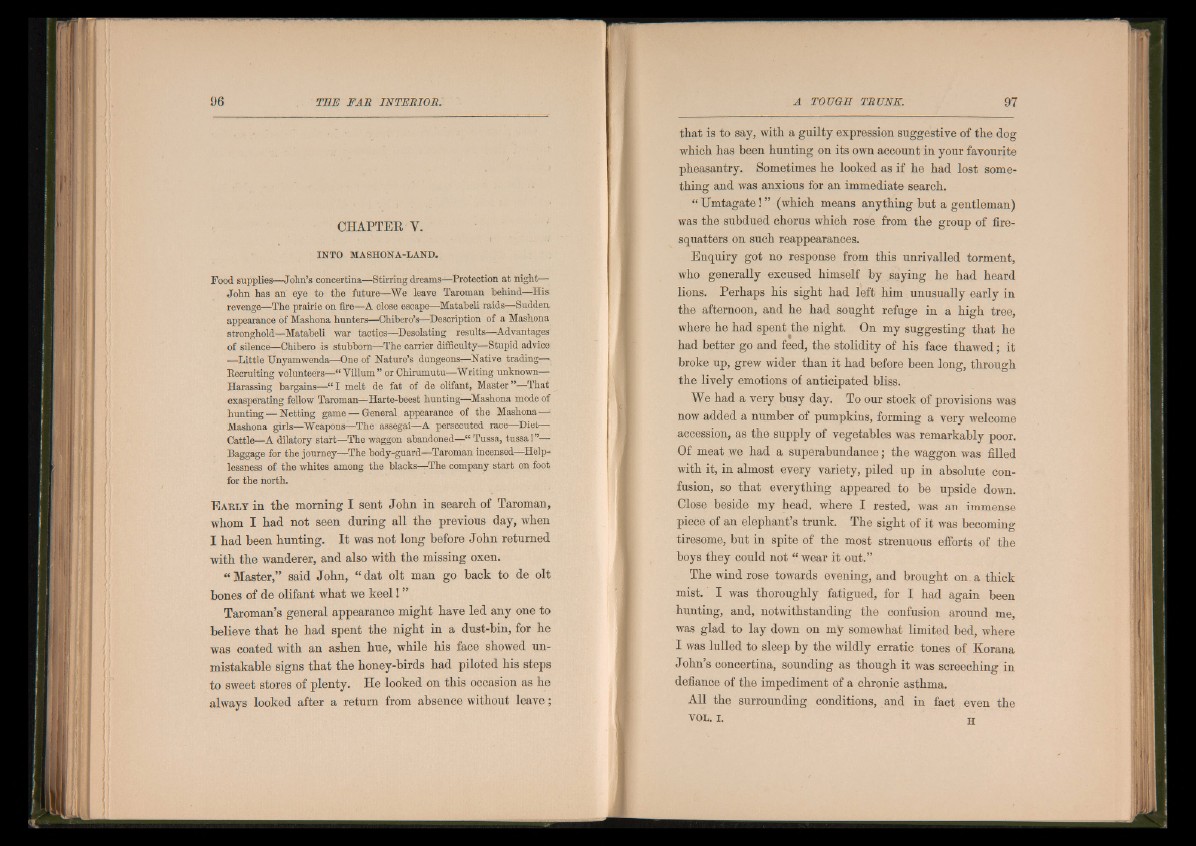
CHAPTER Y.
INTO MASHONA-LAND.
Food supplies—John’s concertina—Stirring dreams—Protection at night—
John has an eye to the future—We leave Taroman behind—-His
revenge—The prairie on fire—A close escape—Matabeli raids—Sudden,
appearance of Mashona hunters—Chibero’s—Description of a Mashona
stronghold—Matabeli war tactics—Desolating results—Advantages
of silence—Chibero is stubborn—The carrier difficulty—Stupid advice
—Little Unyamwenda—One of Nature’s dungeons—Native trading—
Ti.fioniit.iTig volunteers—“ Villum ” or Chirumutu—-Writing unknown—
Harassing bargains—“ I melt de fat of de olifant, Master ”—That
exasperating fellow Taroman—Harte-beest hunting—Mashona mode of
hunting—Netting game — General appearance of the Mashona—<
Mashona girls—Weapons—The assegai—A persecuted race—Diet—
Cattle—A dilatory start—The waggon abandoned—“ Tussa, tussa!”—
Baggage for the journey—The body-guard—Taroman incensed—Helplessness
of the whites among the blacks—The company start on foot
for the north.
E a r l y in the morning I sent John in search o f Taroman,
whom I had not seen during all the previous day, when
I had been hunting. I t was not long before John returned
with the wanderer, and also with the missing oxen.
“ Master,” said John, “ dat olt man go back to de olt
bones of de olifant what we k eel! ”
Taroman’s general appearance might have led any one to
believe that he had spent the night in a dust-bin, for he
was coated with an ashen hue, while his face showed unmistakable
signs that the honey-birds had piloted his steps
to sweet stores of plenty. He looked on this occasion as he
always looked after a return from absence without leave;
that is to say, with a guilty expression suggestive of the dog
which has been hunting on its own account in your favourite
pheasantry. Sometimes he looked as if he had lost something
and was anxious for an immediate search.
“ Umtagate! ” (which means anything but a gentleman)
was the subdued chorus which rose from the group of fire-
squatters on such reappearances.
Enquiry got no response from this unrivalled torment,
who generally excused himself by saying he had heard
lions. Perhaps his sight had left him unusually early in
the afternoon, and he had sought refuge in a high tree,
where he had spent the night. On my suggesting that he
had better go and feed, the stolidity of his face thawed; it
broke up, grew wider than it had before been long, through
the lively emotions of anticipated bliss.
We had a very busy day. To our stock of provisions was
now added a number of pumpkins, forming a very welcome
accession, as the supply of vegetables was remarkably poor.
Of meat we had a superabundance; the waggon was filled
with it, in almost every variety, piled up in absolute confusion,
so that everything appeared to be upside down.
Close beside my head, where I rested, was an immense
piece of an elephant’s trunk. The sight of it was becoming
tiresome, but in spite of the most strenuous efforts of the
boys they could not “ wear it out.”
The wind rose towards evening, and brought on a thick
mist. I was thoroughly fatigued, for I had again been
hunting, and, notwithstanding the confusion around me,
was glad to lay down on my somewhat limited bed, where
I was lulled to sleep by the wildly erratic tones of Korana
John’s concertina, sounding as though it was screeching in
defiance of the impediment of a chronic asthma.
All the surrounding conditions, and in fact even the
v o l . i . H